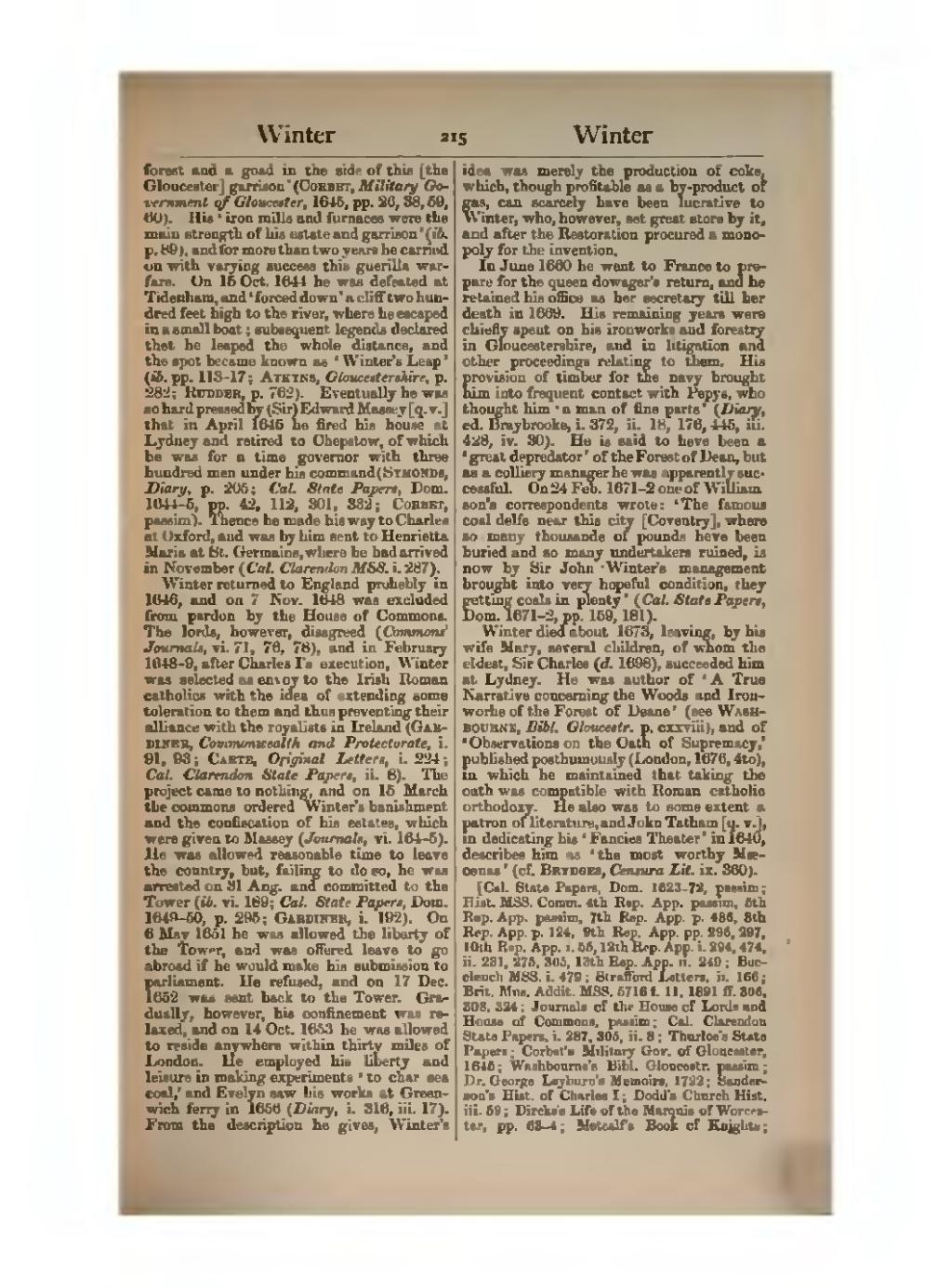forest and a goad in the side of this [the Gloucester] garrison’ (Corbet, Military Government of Gloucester, 1645, pp. 26, 38, 59, 60). His ‘iron mills and furnaces were the main strength of his estate and garrison’ (ib. p. 89), and for more than two years he carried on with varying success this guerilla warfare. On 15 Oct. 1644 he was defeated at Tidenham, and ‘forced down’ a cliff two hundred feet high to the river, where he escaped in a small boat; subsequent legends declared that he leaped the whole distance, and the spot became known as ‘Winter's Leap’ (ib. pp. 113–17; Atkyns, Gloucestershire, p. 282; Rudder, p. 762). Eventually he was so hard pressed by (Sir) Edward Massey [q. v.] that in April 1645 he fired his house at Lydney and retired to Chepstow, of which he was for a time governor with three hundred men under his command (Symonds, Diary, p. 205; Cal. State Papers, Dom. 1644–5, pp. 42, 112, 301, 332; Corbet, passim). Thence he made his way to Charles at Oxford, and was by him sent to Henrietta Maria at St. Germains, where he had arrived in November (Cal. Clarendon MSS. i. 287).
Winter returned to England probably in 1646, and on 7 Nov. 1648 was excluded from pardon by the House of Commons. The lords, however, disagreed (Commons' Journals, vi. 71, 76, 78), and in February 1648–9, after Charles I's execution, Winter was selected as envoy to the Irish Roman catholics with the idea of extending some toleration to them and thus preventing their alliance with the royalists in Ireland (Gardiner, Commonwealth and Protectorate, i. 91, 93; Carte, Original Letters, i. 224; Cal. Clarendon State Papers, ii. 8). The project came to nothing, and on 15 March the commons ordered Winter's banishment and the confiscation of his estates, which were given to Massey (Journals, vi. 164–5). He was allowed reasonable time to leave the country, but, failing to do so, he was arrested on 31 Aug. and committed to the Tower (ib. vi. 189; Cal. State Papers, Dom. 1649–50, p. 295; Gardiner, i. 192). On 6 May 1651 he was allowed the liberty of the Tower, and was offered leave to go abroad if he would make his submission to parliament. He refused, and on 17 Dec. 1652 was sent back to the Tower. Gradually, however, his confinement was relaxed, and on 14 Oct. 1653 he was allowed to reside anywhere within thirty miles of London. He employed his liberty and leisure in making experiments ‘to char sea coal,’ and Evelyn saw his works at Greenwich ferry in 1656 (Diary, i. 316, iii. 17). From the description he gives, Winter's idea was merely the production of coke, which, though profitable as a by-product of gas, can scarcely have been lucrative to Winter, who, however, set great store by it, and after the Restoration procured a monopoly for the invention.
In June 1660 he went to France to prepare for the queen dowager's return, and he retained his office as her secretary till her death in 1669. His remaining years were chiefly spent on his ironworks and forestry in Gloucestershire, and in litigation and other proceedings relating to them. His provision of timber for the navy brought him into frequent contact with Pepys, who thought him ‘a man of fine parts’ (Diary, ed. Braybrooke, i. 372, ii. 18, 176, 445, iii. 428, iv. 30). He is said to have been a ‘great depredator’ of the Forest of Dean, but as a colliery manager he was apparently successful. On 24 Feb. 1671–2 one of Williamson's correspondents wrote: ‘The famous coal delfe near this city [Coventry], where so many thousands of pounds have been buried and so many undertakers ruined, is now by Sir John Winter's management brought into very hopeful condition, they getting coals in plenty’ (Cal. State Papers, Dom. 1671–2, pp. 159, 181).
Winter died about 1673, leaving, by his wife Mary, several children, of whom the eldest, Sir Charles (d. 1698), succeeded him at Lydney. He was author of ‘A True Narrative concerning the Woods and Ironworks of the Forest of Deane’ (see Washbourne, Bibl. Gloucestr. p. cxxviii), and of ‘Observations on the Oath of Supremacy,’ published posthumously (London, 1676, 4to), in which he maintained that taking the oath was compatible with Roman catholic orthodoxy. He also was to some extent a patron of literature, and John Tatham [q. v.], in dedicating his ‘Fancies Theater’ in 1640, describes him as ‘the most worthy Mæcenas’ (cf. Brydges, Censura Lit. ix. 360).
[Cal. State Papers, Dom. 1623–72, passim; Hist. MSS. Comm. 4th Rep. App. passim, 5th Rep. App. passim, 7th Rep. App. p. 486, 8th Rep. App. p. 124, 9th Rep. App. pp. 296, 297, 10th Rep. App. i. 55, 12th Rep. App. i. 294, 474, ii. 231, 275, 305, 13th Rep. App. ii. 249; Buccleuch MSS. i. 479; Strafford Letters, ii. 166; Brit. Mus. Addit. MSS. 5716 f. 11, 1891 ff. 306, 308, 324; Journals of the House of Lords and House of Commons, passim; Cal. Clarendon State Papers, i. 287, 305, ii. 8; Thurloe's State Papers; Corbet's Military Gov. of Gloucester, 1645; Washbourne's Bibl. Gloucestr. passim; Dr. George Leyburn's Memoirs, 1722; Sanderson's Hist. of Charles I; Dodd's Church Hist. iii. 59; Dircks's Life of the Marquis of Worcester, pp. 63–4; Metcalf's Book of Knights;
